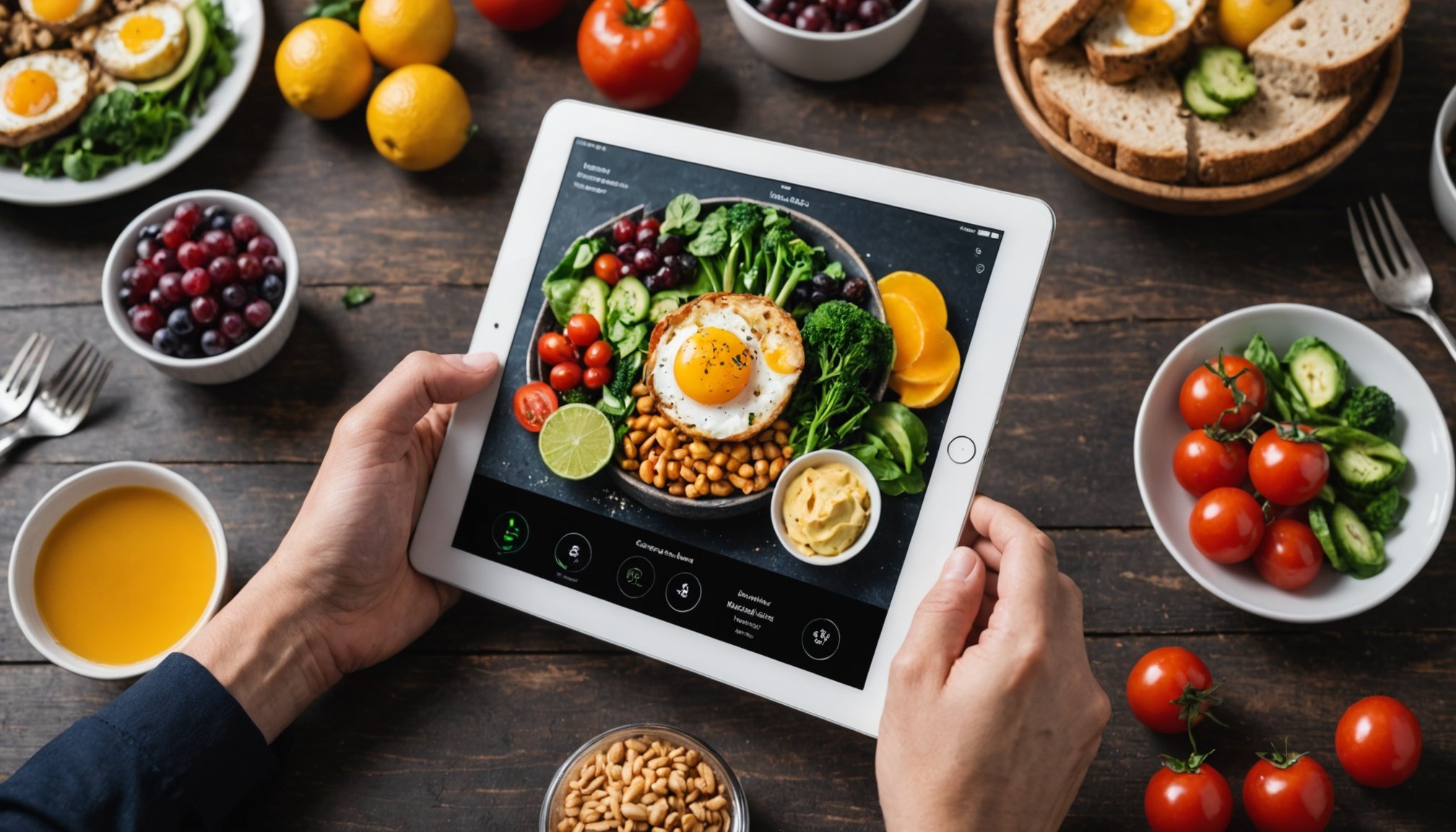Transforming Health Tech in the UK: Personalized Nutrition Plans Powered by AI
In the ever-evolving landscape of health technology, one of the most promising and rapidly growing areas is personalized nutrition, driven by the power of artificial intelligence (AI). This innovative approach is revolutionizing the way we think about food, health, and wellness, offering tailored dietary recommendations that cater to an individual’s unique genetic, phenotypic, and behavioral characteristics.
The Rise of Personalized Nutrition
Personalized nutrition is more than just a trend; it’s a movement that’s gaining momentum globally, and the UK is at the forefront of this revolution. The concept is simple yet powerful: by analyzing vast amounts of dietary and health data, AI can provide customized dietary recommendations that are far more effective than generic diet plans.
In the same genre : Innovative marina construction: building eco-friendly solutions
The Role of AI in Personalized Nutrition
AI is the backbone of personalized nutrition, enabling the creation of prediction models that take into account a person’s genetic profile, lifestyle, and health goals. For instance, companies like Zydus Wellness are leveraging AI to develop platforms like Nutralite Chef, which uses web interfaces and WhatsApp to offer meal planning and tailored recipe recommendations[1].
"We are advancing innovation by combining state-of-the-art technologies with food science to address practical issues," said Tarun Arora, CEO of Zydus Wellness.
How AI-Powered Nutrition Plans Work
The process of creating AI-powered nutrition plans involves several key steps:
In the same genre : Revolutionizing food delivery in the uk: top strategies for streamlined logistics management
Data Collection
- Users provide detailed information about their health, including genetic data, biochemical profiles, and lifestyle habits.
- Wearables and digital health platforms collect real-time data on physical activity, sleep patterns, and other health metrics.
Data Analysis
- AI algorithms analyze the collected data to identify patterns and correlations that can inform dietary recommendations.
- Machine learning models are trained on large datasets to predict how different foods and nutrients will affect an individual’s health.
Personalized Recommendations
- Based on the analysis, the AI system generates personalized dietary recommendations, including meal plans and nutritional advice.
- These recommendations are continuously updated as new data is collected, ensuring that the plans remain relevant and effective.
The Impact on Health Outcomes
The integration of AI with personalized nutrition is driving significant improvements in health outcomes. Here are a few key areas where this technology is making a difference:
Weight Management
- Personalized diet plans can help individuals achieve their weight management goals more effectively by providing tailored calorie and nutrient recommendations.
- For example, a study using AI-driven nutrition planning showed that participants who followed personalized diet plans had better weight loss outcomes compared to those on generic diets.
Chronic Disease Prevention
- By focusing on the unique nutritional needs of an individual, AI-powered nutrition plans can help prevent chronic diseases such as diabetes and heart disease.
- For instance, research at the National Center for Supercomputing Applications and the University of Illinois Urbana-Champaign is using microbiome analysis to create personalized nutrition plans that can help manage and prevent diseases linked to gut health[2].
Key Trends in Personalized Nutrition
Several trends are shaping the future of personalized nutrition in the UK:
Growing Demand for Functional Foods
- There is a growing demand for functional foods that can improve performance, lower the risk of disease, and promote overall health. This trend is driving the expansion of the personalized retail nutrition and wellness market[1].
Shift Towards Clean-Label and Sustainable Products
- Consumers are increasingly looking for products that align with their ethical and environmental values. This shift is pushing businesses to develop customized products that are not only healthy but also sustainable[1].
High Cost of Personalized Products
- One of the challenges facing the adoption of personalized nutrition is the higher cost compared to generic alternatives. However, advancements in technology are making these solutions more accessible and affordable[1].
Real-World Applications and Examples
Several companies and research institutions are already implementing AI-powered personalized nutrition in innovative ways:
Zydus Wellness and Nutralite Chef
- As mentioned earlier, Zydus Wellness has launched Nutralite Chef, an AI-powered food technology platform that offers meal planning and tailored recipe recommendations through web interfaces and WhatsApp[1].
Illinois Computes and Microbiome Research
- Researchers at the National Center for Supercomputing Applications and the University of Illinois Urbana-Champaign are using AI to map the microbiome and create personalized nutrition plans. This research aims to empower individuals to make dietary choices that align with their unique microbiome profiles[2].
Practical Insights and Actionable Advice
For those interested in leveraging AI-powered personalized nutrition, here are some practical insights and actionable advice:
Start with Data Collection
- Begin by collecting as much data as possible about your health, including genetic data, biochemical profiles, and lifestyle habits. Use wearables and digital health platforms to gather real-time data.
Choose the Right App
- Select a nutrition app that uses AI to provide personalized recommendations. Apps like Fitness Calculator, Shopwell, and HealthTap are popular choices that promote healthy lifestyles[1].
Consult with a Healthcare Professional
- Before making any significant changes to your diet, consult with a healthcare professional. They can help you understand how AI-powered nutrition plans can align with your health goals.
Overcoming Challenges and Concerns
While AI-powered personalized nutrition offers numerous benefits, there are also challenges and concerns that need to be addressed:
Data Privacy and Security
- One of the top concerns is the privacy and security of patient data. Healthcare organizations must ensure that they are transparent about how data is collected, shared, and protected[5].
Cost and Accessibility
- The high cost of personalized nutrition solutions can be a barrier for many users. However, as technology advances, these solutions are becoming more affordable and accessible[1].
Future Outlook
The future of personalized nutrition in the UK looks promising, driven by advancements in AI and machine learning. Here are some key trends and predictions:
Increased Adoption of AI in Healthcare
- AI is expected to play a more significant role in healthcare, including personalized nutrition. Healthcare organizations are increasingly integrating AI into their digital communications to enhance patient engagement and outcomes[5].
Advancements in Microbiome Research
- Research into the microbiome is expected to continue, leading to more accurate and personalized nutrition plans. This could revolutionize how we approach diet and health[2].
Greater Focus on Sustainability
- There will be a greater focus on sustainability and clean-label products, aligning with consumer preferences for natural, organic, and minimally processed foods[1].
AI-powered personalized nutrition is transforming the health tech landscape in the UK, offering a tailored approach to dietary recommendations that can significantly improve health outcomes. As technology continues to advance, we can expect to see even more innovative solutions that make personalized nutrition accessible and effective for a wider audience.
| **Feature** | **Description** | **Benefits** |
|
|-----------------|
|
| **AI-Driven Analysis** | Analyzes vast amounts of dietary and health data | Provides customized dietary recommendations |
| **Real-Time Data Collection** | Uses wearables and digital health platforms | Ensures recommendations are up-to-date and relevant |
| **Personalized Meal Plans** | Generates meal plans based on individual health goals | Helps in weight management and chronic disease prevention |
| **Microbiome Analysis** | Maps the microbiome to create personalized nutrition plans | Empowers individuals to make informed dietary choices |
| **Clean-Label and Sustainable Products** | Aligns with consumer preferences for natural and sustainable products | Promotes ethical and environmental values |
| **Data Privacy and Security** | Ensures transparency and security of patient data | Builds trust and loyalty among users |
Detailed Bullet Point List: Benefits of AI-Powered Personalized Nutrition
- Customized Dietary Recommendations: AI analyzes individual health data to provide tailored dietary advice.
- Improved Health Outcomes: Personalized nutrition plans can lead to better weight management and reduced risk of chronic diseases.
- Real-Time Updates: Recommendations are continuously updated based on real-time data from wearables and digital health platforms.
- Increased Efficiency: AI automates the process of analyzing large datasets, making it more efficient than traditional methods.
- Enhanced Patient Engagement: Personalized nutrition plans can increase patient engagement and satisfaction with healthcare services.
- Sustainability and Clean-Label Products: Aligns with consumer preferences for natural, organic, and minimally processed foods.
- Data-Driven Insights: Provides comprehensive insights into an individual’s health profile, enabling better decision-making.
- Cost-Effective: As technology advances, personalized nutrition solutions are becoming more affordable and accessible.
By embracing AI-powered personalized nutrition, individuals in the UK can take a significant step towards achieving their health goals and living a healthier, more balanced lifestyle.











